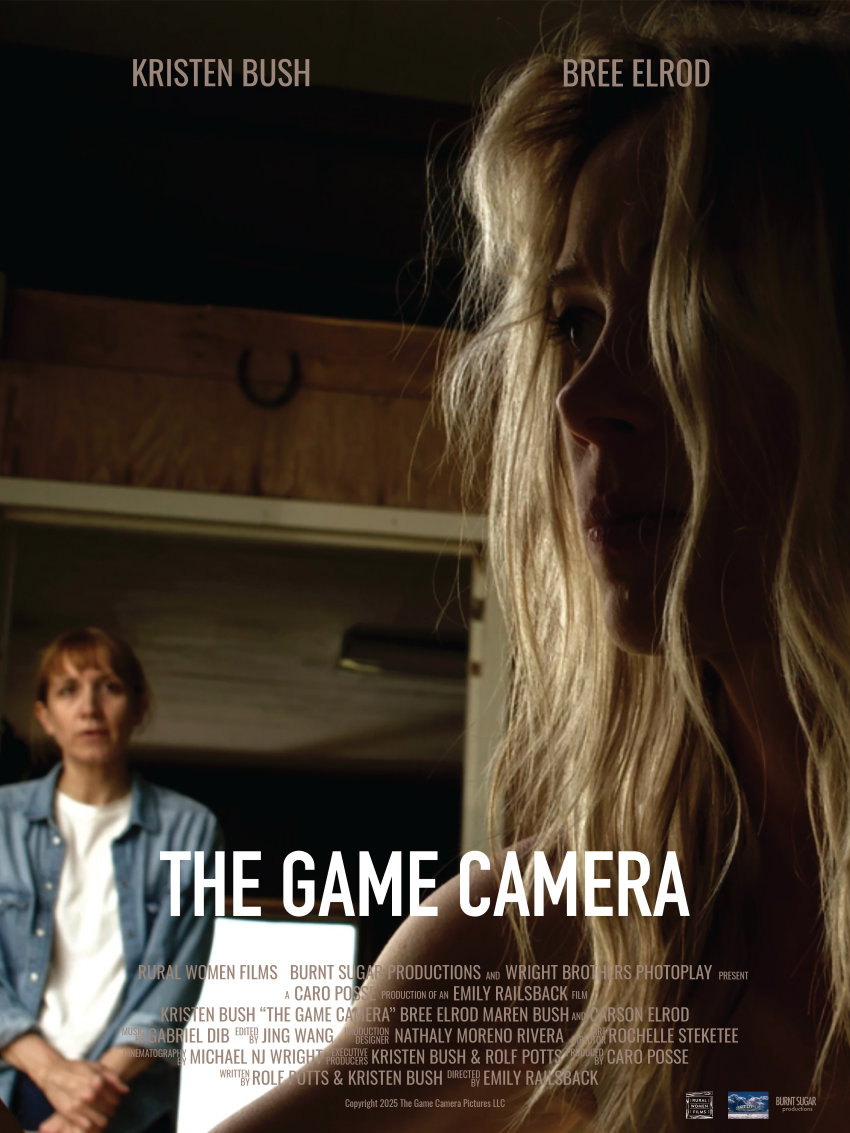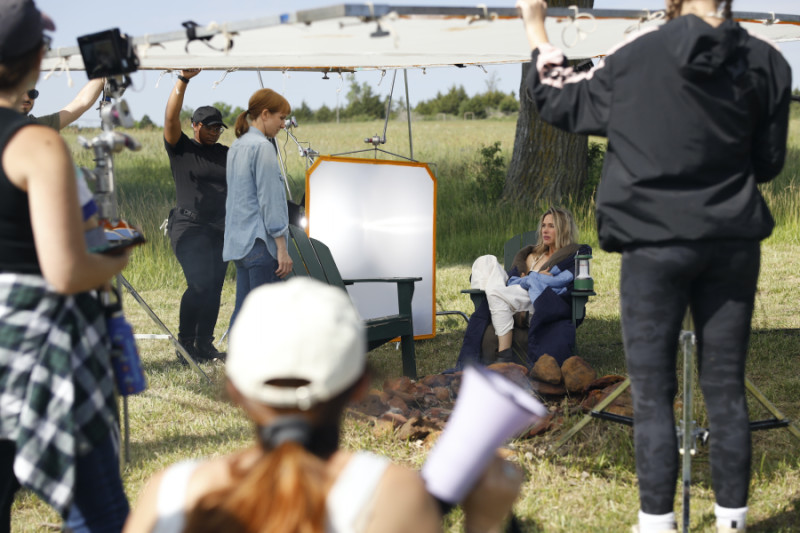By Sheridan Wimmer on November 12, 2024
Kansas filmmakers advocate for rural landscapes, women in cinema
Lights, camera, action for rural Kansas and women interested in filmmaking
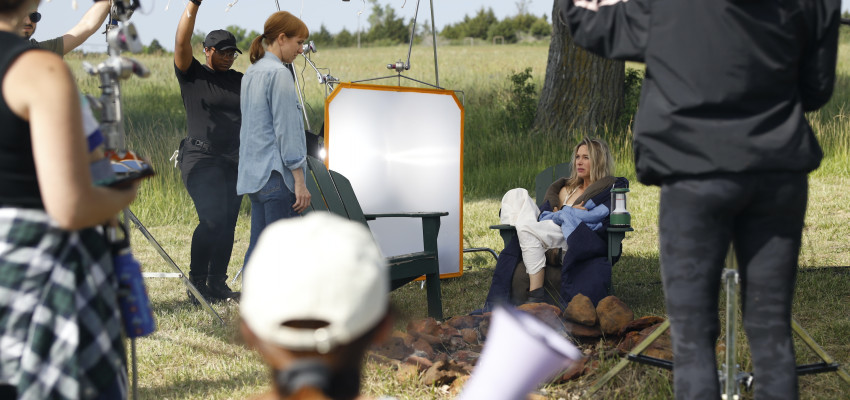
Grief is a universal experience — to love and lose someone is a beautiful yet painful part of life. What may not be quite as universal is a love for Kansas. If you’re from Kansas, you likely have a fondness for the prairie, the mourning doves in the morning and the captivating sunsets in our open sky.
Kristen “Kiki” Bush, a Rice County native with an immense amount of love for Kansas, co-wrote, co-executive-produced, and starred as Ann in the short film, “The Game Camera,” which was set and filmed in rural Kansas. In the film, Ann’s vision of a human intruder through a game camera makes her reconsider her husband’s death. This isn’t Bush’s first time in front of the camera. She’s acted in “Law & Order: Special Victims Unit,” “The Good Wife,” “Suits,” “Elementary” and many others. Most of her roles take her away from the Sunflower State but she hopes to change that.
Putting Kansas in the Spotlight
Bush has testified at the Kansas Statehouse to support tax incentives that would encourage filmmakers to choose Kansas as their cinematography destination. Today, filmmakers shoot movies in states like California, Illinois or New York, due to tax incentives and established filmmaking-industry infrastructure, or in states like Georgia, New Mexico, or Oklahoma, because of substantial tax credits.
Of course, no one is surprised that California is the top spot for the Spielbergs and Tarantinos of the industry. Hollywood sits at the highest echelon of film production, partly because productions can qualify for California’s 20 percent tax break for non-independent films and a 25 percent transferable credit for independent films, as long as productions spend 75 percent of their budget or film days in-state, according to Wrapbook.
Kansas doesn’t have these tax breaks for filmmakers, which makes shooting a movie in the state an expensive feat. Bush doesn’t claim to be famous, based on her testimony in front of the Kansas House of Representatives to support HB 2182 in the 2023 legislature, but her love for acting and cinema exudes from her.
“In researching the film “Tulsa King,” which I auditioned for, I discovered the original name was “Kansas City King” and was meant to be shot in the Kansas City area,” Bush says in her testimony. “The show’s location changed because Oklahoma offers film incentives that Kansas doesn’t.”
Since that time, Missouri has developed tax incentives to attract filmmakers, but unfortunately, the Kansas bill Bush testified in favor of was vetoed in 2024. But she didn’t let that stop her from moving forward with her passion project.
“There’s work being done with Grow Kansas Film to try to get a new bill passed for tax incentives,” Bush says. “I’m a big advocate of it because even making short films is a costly endeavor. It takes so many people to make a film, and we want to support rural Kansas, its people and the creativity we have in our own state.”
Behind the Scenes of a Kansas Film
Bush, never one to back down from a scary role or a less-than-ideal budget situation, set her sights on creating her own movie in rural Kansas.
“I think our state is really beautiful, and I think our state has a lot of really interesting stories to tell that don't need to be then shunted down to the south to Oklahoma or over to Missouri,” Bush says.
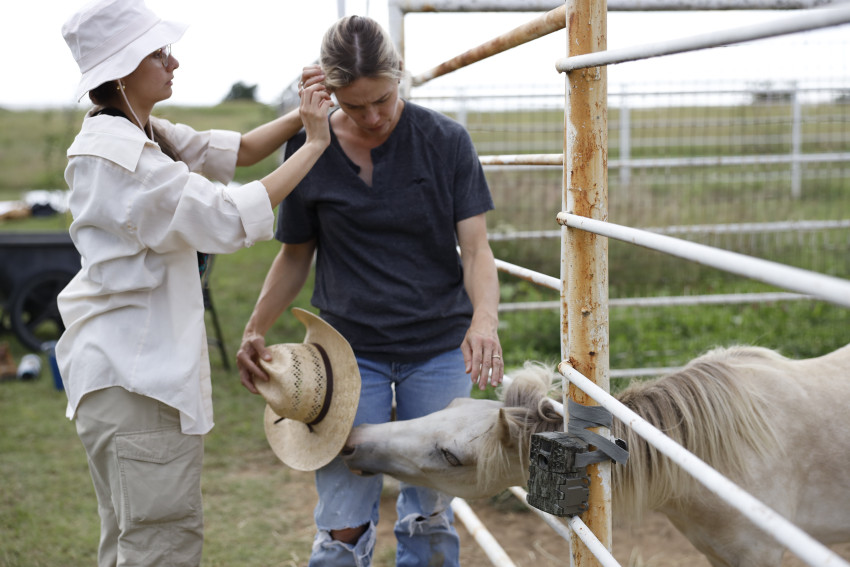
Kristen "Kiki" Bush with mini-horse, Kippy, in the movie "The Game Camera." Photo by Shane Clark.
The incentives, while attractive, didn’t turn Bush away from creating the piece of art she envisioned. Shooting “The Game Camera” in Oklahoma might have saved as much as $12,000, but doing so would have compromised not only the movie’s authenticity, but also her own.
The film showcases the beauty of Kansas through sounds and imagery of the Kansas we love. The relief of a light breeze in the summer months, the Meadowlark singing and of cottonwoods offering shade in the bright, cloudless sky.
“We have a very charismatic sky,” Bush says. “It changes all the time, and it feels very essentially Kansas.”
The opening scene of “The Game Camera” showcases Ann jumping out of bed to the sound of coyotes — also a Kansas sound we’re all familiar with — to protect her mini-horse, Kippy. When her sleepless nights worry a friend, Ann is gifted a game camera to monitor Kippy. Images appear of the usual suspects — deer, raccoons, opossum — but also an unusual suspect. The appearance of a man's lower half on the game camera stirs a mix of emotions in Ann as she confronts her grief after the death of her husband.
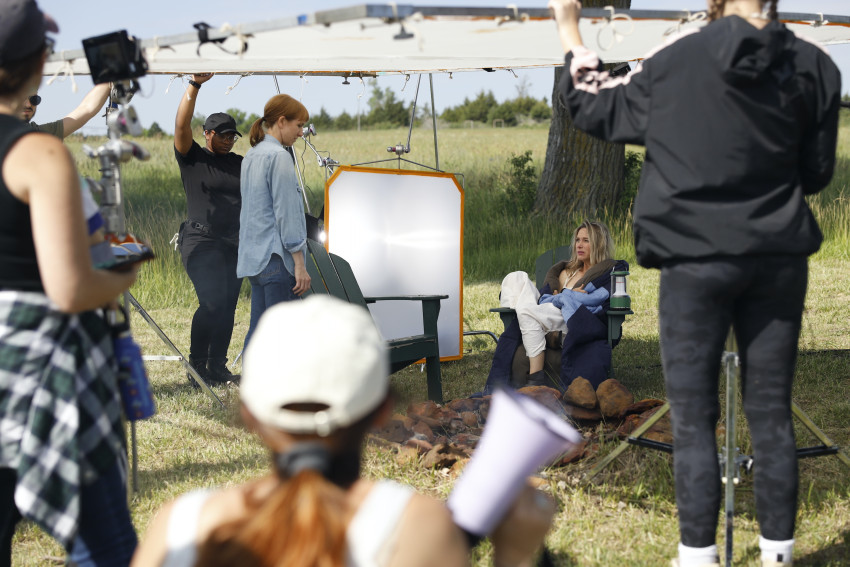
The Game Camera, a passion project made up of mostly Kansas women, sets up for another take in the Kansas sun. Photo by Shane Clark.
Kippy was the last gift Ann received from her husband before he passed away, and as she navigates the sometimes-messy journey through grief, familiar scenes resonate with many Kansans — the charming rural farmhouse, the trip to the local hardware store for horse feed and the labor and sometimes loneliness involved in a farm and ranch lifestyle. These images evoke memories and make you connect intrinsically with the characters — whether through grief, rural life or both.
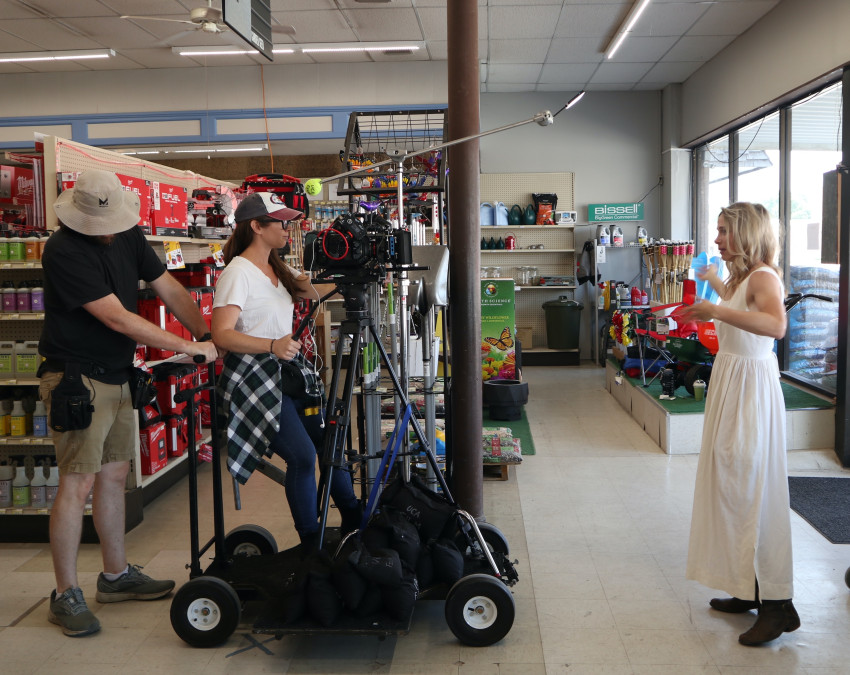
A local hardware store in Hillsboro was featured in the film, The Game Camera. Photo by Shane Clark.
A Focus on Females
Filming the movie in Kansas was important for Bush, not only for the imagery and authenticity it brings to the script, but also to support Kansas creatives, especially women.
Bush is co-creator of Rural Women Films, a company created in 2023 along with the director of “The Game Camera,” Emily Railsback.
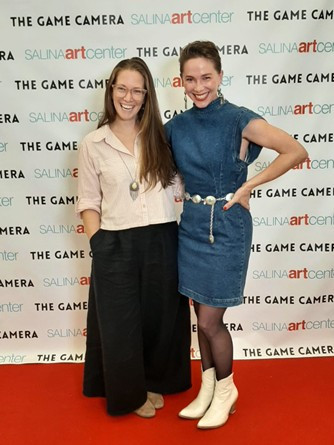
Emily Railsback and Kristen Bush
Railsback, who was raised in Hillsboro, specializes in terroir, which is the connection of time and place, and highlights stories that feature strong female characters especially in rural settings. Her film, “American Parent,” won Best of Fest at the 2023 British Film Institute’s Flare Festival. She and Bush have worked on several films together and are passionate about women’s roles in filmmaking from start to finish.
A study in 2023 by San Diego State University found that women accounted for only 22 percent of all directors, writers, producers, executive producers, editors and cinematographers on the 250 top-grossing films. Not only this, but Bush points out that only about one-third of on-screen speaking roles were female and as women age, their representation on screen decreases. Bush, Railsback and others are dedicated to creating more opportunities to support women in the film industry, both in front of and behind the camera.
"I feel like I'm seeing a lot of young women who are learning to be cinematographers and editors and directors,” Railsback says. “So for me, I don't feel it's as bleak as those numbers, which are awful, but I think I've always wanted to tell women's stories, and I think there's something about women from the Midwest that they're very strong but don't always get the limelight."
“It’s my hope that a generation from now, the next small-town girl who dreams of becoming an actor won’t have to leave Kansas to put her dreams into action,” Bush says.
For people like Bush, Railsback and others involved in “The Game Camera,” making Kansas a showstopper state instead of a flyover state is their passion. By committing to a vision of Kansas that inspires others to share the same passion for filmmaking, they have set the stage for a bright future.
The Game Camera is currently embarking on the film festival circuit. For more information about screenings, and where it will be available to watch online, visit Rural Women Films.

